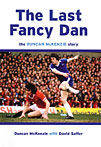 The Duncan McKenzie Story
The Duncan McKenzie Story
by Duncan McKenzie and David Saffer
Vertical Editions, £17.99
Reviewed by Mark O'Brien
From WSC 274 December 2009
Duncan McKenzie openly admits that his style of play divided opinions. There were those who saw him as a luxury player, while others considered him the sort of maverick who could unlock defences in an era, the 1970s, when men like Ron Harris and Tommy Smith would emasculate forwards as soon as look at them.
At first his autobiography grates, as he talks about himself and his own ability in rather glowing terms. He puts himself in the same bracket as Tony Currie, Rodney Marsh and Stan Bowles, and thinks nothing of declaring that, according to Nottingham Forest fans, his performance in a 4-3 win over Manchester City was “the best game they ever saw an individual play at the City Ground”.
In fairness, though, McKenzie does openly admit to being a cocky and self-confident individual. What makes him seem more likeable is the fact that he still clearly loves football and considers himself lucky to have made a living out of it, as a player, in the media and on the after dinner circuit.
McKenzie has genuine affection and admiration for the players he lined up against and alongside during his days at Forest, Everton and, perhaps most famously, Leeds United when Brian Clough made him his first signing. He reckons David Peace’s The Damned United is a pretty good representation of what went on during those turbulent 44 days and believes that the Leeds board created the no-win situation because they bottled out of choosing between Billy Bremner and Johnny Giles as successor to Don Revie.
Whereas many ex-players use their memoirs to settle old scores, McKenzie seems philosophical throughout. He refuses to be too harsh on Jimmy Armfield, who he believes should have sent him on in the 1975 European Cup final, and even has good words for Gordon Lee, despite the fact that the Everton boss’s preference for the more prosaic Jim Pearson over McKenzie is often held up as an example of the negative approach he brought to Goodison Park.
Perhaps the most interesting part concerns McKenzie’s season playing for Anderlecht. He won his one career medal in Belgium, in the European Super Cup, when the promise of a £5,000 bonus per player, following a 2-1 defeat away to Bayern Munich, inspired a 4-2 victory in the return leg. You don’t often read about the mid-1970s Belgian league, so it comes as a surprise to learn how heated some of the rivalries were – players were forced to barricade themselves in the changing rooms to escape from rampaging supporters of the wonderfully named KFC Winterslag.
The last couple of chapters sag a bit, with the usual powder puff opinions on the modern game, but apart from wondering how Cristiano Ronaldo would have fared on the pitch at the Baseball Ground, McKenzie steers clear of slagging off today’s players. All in all, The Last Fancy Dan is inconsistent but sporadically entertaining. A bit like Duncan McKenzie himself.